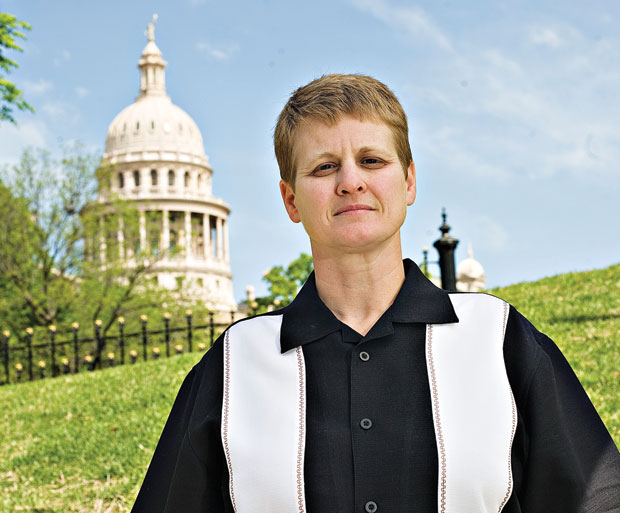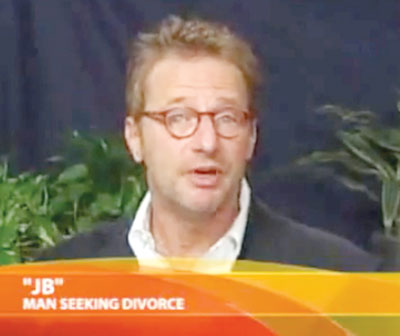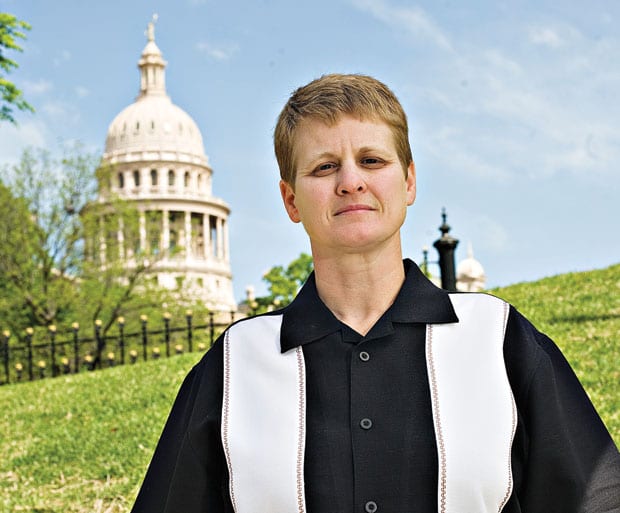The state Supreme Court is scheduled to hear its first LGBT-related cases in recent history, but that’s not necessarily a good thing

UN-DIVORCED? Angelique Naylor, pictured, was granted a divorce from her ex-wife, Sabina Daly, by a state district judge in Austin in 2010. But if Attorney General Greg Abbott has his way, their divorce will be overturned by the Texas Supreme Court. (Associated Press)
The Internal Revenue Service’s announcement last week that it will recognize all same-sex marriages for tax purposes was hailed as a major victory for LGBT equality.
But for same-sex couples seeking divorces in Texas, the new IRS rules may only compound their problems.
Because the state’s attorney general has sought to block the couples from dissolving the marriages they legally entered in Massachusetts, they will be required to file federal income tax returns as married — even if they’ve long since split up.
“If you don’t even know where your ex is, let alone what his life circumstances are, how are you going to do that?” said Ken Upton, Dallas-based supervising senior staff attorney at Lambda Legal, the LGBT civil rights group. “Literally, they’re trapped.”
Lambda Legal, in conjunction with the American Civil Liberties Union, filed a friend-of-the-court brief this week calling on the Texas Supreme Court to allow gay couples to divorce here, and arguing that such a narrow ruling wouldn’t run afoul of the state’s bans on same-sex marriage.
The court has set oral arguments for early November in two pending same-sex divorce cases — nearly five years after the first uncontested petition was filed in Dallas County. Republican AG Greg
Abbott intervened in both cases, arguing Texas judges can’t grant divorces to same-sex couples because the state doesn’t recognize their marriages — and resulting in conflicting opinions from appeals courts in Austin and Dallas.
Upton said according to Lambda Legal’s research, it will be the first time in recent history, perhaps ever, that the Texas Supreme Court has heard a gay-rights case, and he’s concerned about the prospect of having the all-Republican body whose justices face re-election every six years weigh in on an LGBT issue.
In fact, despite Lambda Legal’s filing this week, Upton remained outspoken in questioning the couples’ attorneys’ decision to pursue the divorce cases — saying a negative ruling from the state Supreme
Court would create a bad precedent that could influence other judges in Texas and beyond.
“It’s the nature of the court game that a lot of people don’t get if they’re not lawyers,” Upton said. “Every bad decision tips the scale a little on that side. It makes it harder to win in places you should have a good chance when you’re piling up losses in states where you never really had a chance. I think it’s a case that’s filed in a court I’d rather not have deciding the issue right now. There are plenty of other places where we have better chances.”
The attorneys representing the same-sex couples seeking divorces counter that the needs of their clients trump what may be perceived as best for LGBT equality.
“Our position all along has been that this is not about a movement,” said Jason Steed, a Dallas attorney who’s representing the couples pro bono on appeal. “We’ve got two couples that wanted to get divorced. I think certainly no one’s looking to hurt the movement, but that’s not the primary concern. The primary concern is that the clients are trying to move on with their lives.”
Steed’s co-counsel, James “Jody” Scheske of Austin, said he’s advised their clients not to discuss the cases with the media.
Pete Schulte of Dallas, the originating attorney in one of the divorce cases, said he was excited to learn that the Texas Supreme Court will hear them.
Schulte said the U.S. Supreme Court’s decision in June striking down a portion of the Defense of Marriage Act raises issues concerning equal protection under the law for gay couples residing in states that don’t recognize their marriages — as well as questions related to the principle of full faith and credit between states.
While out-of-state same-sex marriages may not have meant much legally for Texas couples five years ago, they’re now recognized by nearly half of all states as well as the federal government — and the latter has bestowed many benefits regardless of where couples live, including joint tax filing.

5-YEAR FIGHT | Dallas resident ‘J.B.’ is seeking a divorce from his Massachusetts marriage to ‘H.B.’ Their petition was originally filed in January 2009.
“It’s not an issue that’s going to go away,” Schulte said. “Either the courts are going to have to do something or the Legislature’s going to have to do something. This issue’s only going to get worse.”
In the wake of the Supreme Court’s ruling striking down DOMA as unconstitutional, the Texas Supreme Court requested a new round of briefs from the two sides in the divorce cases to address the ruling’s impact.
In their supplemental brief, Steed and Scheske reitereated that the cases are about divorce, not marriage, so the DOMA ruling shouldn’t necessarily apply.
But they also argued that if the Texas Supreme Court opts to consider the legality of the state’s marriage bans, justices should strike them down as unconstitutional under the DOMA ruling in United States v. Windsor.
In the wake of Windsor, national LGBT advocacy groups have said they hope to return to the U.S. Supreme Court within five years with a case that will allow justices to throw out marriage bans in Texas and roughly 30 other states.
“This could be the case,” said Schulte, who’s gay and called it “my stake in the civil rights movement of our era.”
“This is the same thing people thought about Brown v. Board of Education — it doesn’t have a chance,” Schulte said. “And look what Brown did — it ended segregation. If we only did things we thought were going to make good law, I don’t think we’d have half the decisions the Supreme Court has made that have benefited civil rights through the ages.”
Upton, on the other hand, said he believes it’s unlikely the U.S. Supreme Court would take the divorce cases unless the Texas Supreme Court were to strike down the state’s marriage bans on federal constitutional grounds — a seemingly remote possibility.
But even though they disagree about the wisdom of pursuing the cases, Lambda Legal and attorneys for the couples agree that Abbott’s effort to keep them married flies in the face of reason.
“If you allow them to get a divorce, that accomplishes the stated purpose of Texas law, to not have same-sex marriage in Texas,” Steed said. “If you allow these divorces, you have two fewer same-sex marriages in Texas.”
Upton said Abbott is attempting to make “the most illogical argument in the world, and if the attorney general can’t figure out how to make that argument, then it’s clear that this case is about punishing people that you don’t like.”
Abbott is running for governor in 2014, and LGBT advocates have long suggested that his involvement in the cases is politically motivated.
Other Republican elected officials have also filed briefs opposing same-sex divorce, including Agriculture Commissioner Todd Staples, who’s running for lieutenant governor in 2014, and state Rep.
Dan Branch of Highland Park, who’s seeking to replace Abbott as attorney general.
“I think the highest motive is probably pandering to a base,” said Chuck Smith, executive director of Equality Texas, the statewide LGBT advocacy group. “It’s a political decision based on a belief that somehow preventing people from getting a divorce is furthering restrictions on marriage. I think the gut or the gist of the case is whether or not that’s a correct statement.”
A spokesman for the AG’s office said Abbott isn’t commenting on the cases beyond briefs that have been filed.
“It speaks volumes in the briefs,” the spokesman said.
Three years ago, at the appeals court in Dallas, Abbott’s office allowed attorneys from the right-wing Liberty Institute to do the talking when they staged a press conference following oral arguments.
Jonathan Saenz, executive director of Texas Values (formerly the Liberty Institute), didn’t return a phone call seeking comment for this story.
When asked how much taxpayer money has been spent to litigate the cases, the AG’s spokesman said, “The attorneys work here anyway. If they didn’t work on these cases, they’d be working on something else.”
Dallas Voice filed a request this week under the Freedom of Information Act seeking a record of all costs incurred by the AG’s office to fight gay divorce.
Oral arguments are set for 9 a.m. on Tuesday, Nov. 5 in Austin. Each side has been allotted 25 minutes.
This article appeared in the Dallas Voice print edition September 6, 2013.
[polldaddy poll=7374906]

